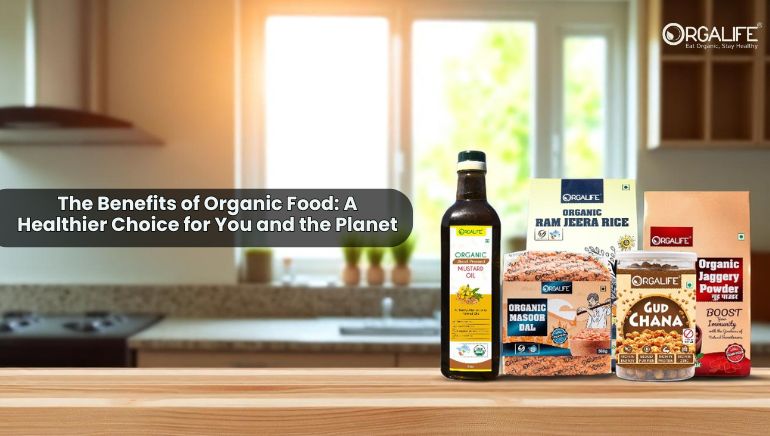The Benefits of Organic Food: A Healthier Choice for You and the Planet
In today’s fast-paced world, health and wellness have taken center stage. People are increasingly aware of what they eat, where it comes from, and how it’s produced. One of the most significant trends in this movement is the growing interest in organic food products. Consumers are opting for food that is free from chemicals, grown sustainably, and is believed to offer superior health benefits. This blog explores what organic food is, the major benefits of organic food, and whether it truly stands out from conventional food choices.
What Is Organic Food?
Organic food refers to items that are grown or produced without synthetic chemicals, including artificial pesticides, fertilizers, genetically modified organisms (GMOs), growth hormones, or antibiotics. Organic farming practices focus on using natural substances and processes to maintain soil fertility, promote biodiversity, and support ecological balance.
Organic certification in India is regulated through programs such as the India Organic label and Participatory Guarantee System (PGS-India). These standards ensure that food labeled “organic” genuinely meets stringent requirements.
Top Benefits of Organic Food
1. Free from Harmful Chemicals
One of the most obvious benefits of organic food is that it’s grown without synthetic pesticides and fertilizers. Long-term exposure to these chemicals—often found in conventional produce—has been linked to various health issues. Organic food offers a safer, cleaner option, especially for vulnerable groups like children, pregnant women, and the elderly.
2. Richer in Nutrients
Numerous studies suggest that organic food products may contain higher levels of certain nutrients compared to their conventionally grown counterparts. For example, organic fruits and vegetables often have more antioxidants, vitamins, and minerals, which can help combat inflammation and boost overall health.
3. Better for the Environment
Organic farming is not just about what you eat—it’s also about how that food is grown. By avoiding synthetic inputs, organic practices protect water sources from chemical runoff, promote healthier soil, and reduce carbon emissions. Supporting organic agriculture means supporting the planet’s well-being.
4. Supports Animal Welfare
In the case of organic dairy, eggs, and meat, the animals are raised in humane conditions. They are not given antibiotics or synthetic hormones, and they have access to outdoor spaces. This leads to not only happier animals but also healthier food products.
5. Fresher, Tastier Produce
Many people report that organic food products taste better than conventional ones. This may be due to the natural growing process, the absence of preservatives, and the fact that organic food is often sold locally and consumed sooner after harvest.
Is Organic Food Healthier Than Conventional Food?
This is a common and valid question. The answer isn’t black and white, but there are clear distinctions that make organic food a healthier choice for many.
· Reduced Chemical Exposure: Organic produce carries significantly fewer pesticide residues. Even if conventional food is “within limits,” consistent low-level exposure can add up over time.
· Nutritional Superiority: While not all organic food is dramatically more nutritious, the higher antioxidant levels and absence of GMOs offer a clear advantage.
· No Artificial Additives: Organic food is less likely to contain synthetic preservatives, flavor enhancers, and artificial coloring agents, which are often linked to allergies and behavioral issues in children.
So, is organic food always healthier? For many people, especially those with food sensitivities, children, or those looking to minimize chemical intake, the answer is yes.
The Rise of Organic Food in India
The market for organic food in India is witnessing a strong surge. Farmers’ markets, organic food stores, and online platforms are making these products more accessible than ever. From organic dals and rice to chemical-free fruits and vegetables, Indian households are embracing the shift toward more mindful eating.
Government initiatives are also promoting organic agriculture through subsidies, training programs, and certification support. The North-East region, Sikkim (India’s first fully organic state), and parts of Maharashtra and Chhattisgarh are setting examples for sustainable farming.
How Orgalife Is Making Organic Easy in India
If you’re wondering where to find trustworthy, certified Organic Food products, Orgalife is one of India’s leading platforms making organic living more accessible.

